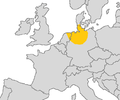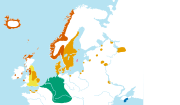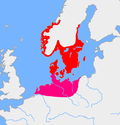the same word pattern is called a declension. There are five grammatical cases in Old High German. A complete declension consists of five grammatical cases...
43 KB (2,771 words) - 16:14, 30 August 2023
Old High German (OHG; German: Althochdeutsch (Ahdt., Ahd.)) is the earliest stage of the German language, conventionally identified as the period from...
44 KB (4,414 words) - 00:33, 19 November 2024
In linguistics, declension (verb: to decline) is the changing of the form of a word, generally to express its syntactic function in the sentence, by way...
29 KB (2,578 words) - 21:34, 17 November 2024
Latin declension is the set of patterns according to which Latin words are declined—that is, have their endings altered to show grammatical case, number...
89 KB (5,209 words) - 23:36, 17 September 2024
baron. IIIc nouns are an Old French creation and have no clear Latin antecedent. IIId nouns represent various other third-declension Latin nouns with stress...
84 KB (7,278 words) - 01:10, 23 October 2024
("mistress", literally "bread kneader"). As in several other old Germanic languages, Old English declensions include five cases: nominative, accusative, dative...
84 KB (8,365 words) - 19:29, 11 November 2024
Lithuanian has a declension system that is similar to declension systems in ancient Indo-European languages, such as Sanskrit, Latin or Ancient Greek...
105 KB (6,175 words) - 20:55, 9 November 2024
Old Saxon (German: altsächsische Sprache), also known as Old Low German (German: altniederdeutsche Sprache), was a Germanic language and the earliest...
32 KB (2,216 words) - 05:21, 21 October 2024
In Russian grammar, the system of declension is elaborate and complex. Nouns, pronouns, adjectives, demonstratives, most numerals and other particles are...
114 KB (5,685 words) - 23:50, 19 November 2024
Swedish. Modern German gradually developed from Old High German, which in turn developed from Proto-Germanic during the Early Middle Ages. German is an inflected...
142 KB (14,338 words) - 17:35, 21 November 2024
of declension are: I: Feminine nouns usually have the same form in all four cases. a) nom., acc. die Frau, dat., gen. der Frau Exceptions are: Old declensions...
17 KB (1,707 words) - 11:13, 5 October 2024
comparison of the IPA system with those used in learners' materials. The declension of Irish nouns, the definite article, and the adjectives is discussed...
34 KB (2,973 words) - 21:59, 23 September 2024
Early New High German (ENHG) is a term for the period in the history of the German language generally defined, following Wilhelm Scherer, as the period...
29 KB (2,753 words) - 11:59, 13 October 2024
advanced stage in Middle Dutch. Old Dutch reflects an intermediate form between Old Saxon and Old High German. Like Old High German, it preserved the three different...
50 KB (5,549 words) - 18:23, 29 October 2024
a declension. There are five grammatical cases in Gothic with a few traces of an old sixth instrumental case.[citation needed] A complete declension consists...
54 KB (3,588 words) - 00:08, 30 June 2024
nouns only have singular and plural forms. Many remnants of former case declensions remain in the Dutch language, but few of them are productive. One exception...
36 KB (3,947 words) - 19:09, 5 November 2024
case declension paradigms for nouns are shown below. Some masculine words ending in -ā (like pitā and kartā) retain 'ā' throughout their declension, only...
16 KB (391 words) - 21:32, 12 August 2024
in regard to noun case declensions, whereas modern Norwegian in comparison has moved towards more analytical word structures. Old Norse had three grammatical...
112 KB (8,843 words) - 17:12, 31 October 2024
Proto-Germanic language (redirect from Proto-German)
the later development of these declensions in languages such as German and Old English, where the strong declensions have more distinct endings. In the...
130 KB (12,136 words) - 03:56, 16 November 2024
agreed with their subject in person and number. Nouns came in numerous declensions (with deep parallels in Latin, Ancient Greek and Sanskrit). Verbs came...
36 KB (2,227 words) - 15:18, 4 July 2024
lowercased. Declension of the polite personal pronoun "Sie": Nominative case: Sie Accusative case: Sie Genitive case: Ihrer Dative case: Ihnen Declension of polite...
23 KB (3,402 words) - 11:34, 20 November 2024
Germanic languages (redirect from German languages)
in fact much less than in the German "strong" endings.) Although it is possible to group the various noun declensions into three basic categories — vowel-stem...
93 KB (9,521 words) - 22:41, 29 October 2024
Middle English (redirect from Middle English declension)
n-stem nouns in Old English, but joined the weak declension in Middle English. Nouns of the strong declension are inherited from the other Old English noun...
66 KB (5,634 words) - 07:26, 4 November 2024
instrumental declension. Though not commonly known to be of pronominal origin, it was, in fact, inherited from Old English hwȳ, which was the declension of hwæt...
20 KB (2,755 words) - 10:46, 7 October 2024
Inflection (category Articles containing Old English (ca. 450-1100)-language text)
while the inflection of nouns, adjectives, adverbs, etc. can be called declension. An inflection expresses grammatical categories with affixation (such...
62 KB (6,185 words) - 15:45, 20 October 2024
Prussian region. The language is called Old Prussian to avoid confusion with the German dialects of Low Prussian and High Prussian and with the adjective Prussian...
46 KB (4,277 words) - 19:05, 20 October 2024
Vocative case (section First declension)
18th and 19th centuries. The older forms are listed under "other forms". Some nouns of the e- and a- stems declensions (both proper ones and not) are...
76 KB (6,264 words) - 10:04, 22 November 2024
borrowed in the 19th and 20th centuries. German Wiktionary lists about 120,000 German words without declensions and conjugations. Of these, more than 2300...
16 KB (1,195 words) - 10:03, 5 August 2024
Germanic umlaut (redirect from German umlaut)
The German phonological umlaut is present in the Old High German period and continues to develop in Middle High German. From the Middle High German, it...
54 KB (5,427 words) - 23:45, 16 November 2024
postposition. This term can be used in languages where nouns have a declensional form that appears exclusively in combination with certain prepositions...
4 KB (462 words) - 18:10, 27 September 2024










